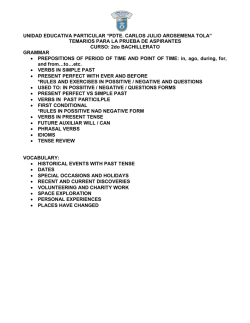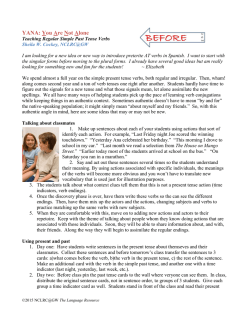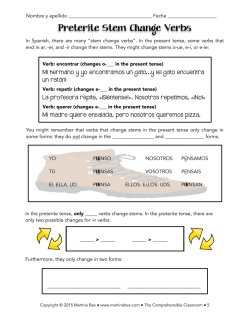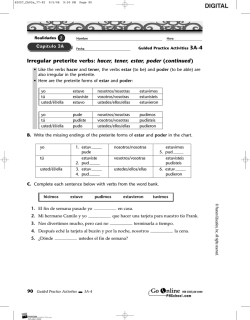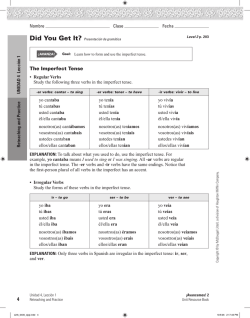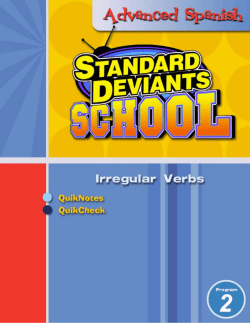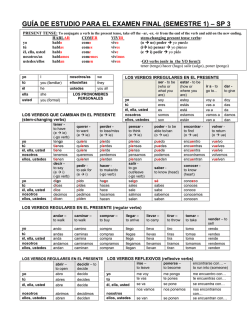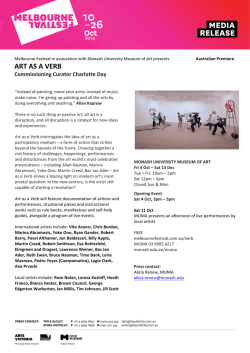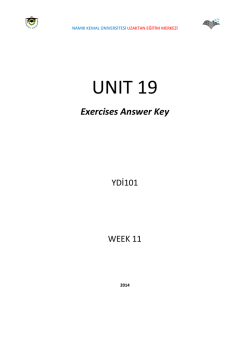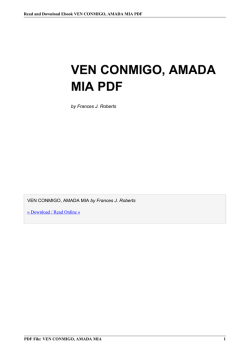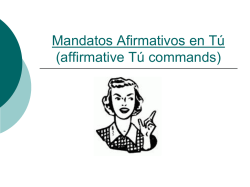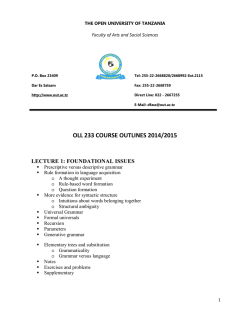
CAPÍTULO 1 MORE STEM-CHANGING VERBS
Menu Print CAPÍTULO 1 MORE STEM-CHANGING VERBS ¡Ven conmigo! Level 3, p. 11 In English For most verbs, the spelling of the stem (the part of the verb that remains when the ending is removed) never changes, even if the ending changes. We begin the lesson. They ask for the answer. Consuelo begins the exam. David asks for the address. One verb that changes spelling in the present tense is the verb I A am able to play. You are able to work. He to be. is able to sing. Underline the stem of each verb and circle the ending, if any. If the verb changes spelling, check the column to the right. SPELLING CHANGE ______________ 1. Alfredo reads the comics. 2. We row on the lake every summer. ______________ 3. Julia is certainly in the park. ______________ 4. I am a big fan of jazz. ______________ 5. You skate on the weekends. ______________ 6. Patrick listens to the program. ______________ 7. We are crazy about apple pie. ______________ 8. You collect stamps. ______________ In Spanish Verb endings change according to the subject. Some Spanish verbs also have spelling changes known as stem changes. Stem changes often occur in all forms except nosotros and vosotros. Review the following present tense stem-changing verbs. o ➠ ue e➠i empiezo empiezas empieza empezamos empezáis empiezan puedo puedes puede podemos podéis pueden pido pides pide pedimos pedís piden C A P Í T U L O yo tú él, ella, Ud. nosotros(as) vosotros(as) ellos, ellas, Uds. e ➠ ie 1 Spanish 3 ¡Ven conmigo!, Chapter 1 Copyright © by Holt, Rinehart and Winston. All rights reserved. Grammar Tutor 123 Print Menu B Underline the stem of each conjugated verb and circle the ending. Then check the column to the right if it is a stem-changing verb. STEM-CHANGING C 1. Yo hablo francés e italiano. ______________ 2. Ellos empiezan a las ocho. ______________ 3. ¿Puedes escuchar la música? ______________ 4. Leemos las tiras cómicas. ______________ 5. Carla pide un refresco. ______________ 6. Ricardo y su hermano tocan la guitarra. ______________ 7. Todos quieren ir a la playa. ______________ 8. Ustedes sacan muchas fotos. ______________ Complete each sentence with the correct present form of the verb in parentheses. pido 1. Voy al restaurante y _________________________ una hamburguesa. (pedir) 2. Mi hermana _________________________ su clase de fotografía hoy. (empezar) 3. Nosotros _________________________ escalar montañas mañana. (poder) 4. Pilar y Rocío _________________________ una tarta en la fiesta. (servir) 5. Tú _________________________ después de ir en barco de vela. (dormir) 6. Ustedes _________________________ hacer esquí acuático. (querer) 7. El camarero nos _________________________ unas pastas deliciosas. (servir) 8. Nosotros le _________________________ un favor al profesor. (pedir) C A P Í T U L O 1 D Conjugate the following verbs in the present tense. preferir volver vestir yo _________________ _________________ _________________ tú _________________ _________________ _________________ él, ella, usted _________________ _________________ _________________ nosotros(as) _________________ _________________ _________________ vosotros(as) _________________ _________________ _________________ ellos, ellas, ustedes _________________ _________________ _________________ Which forms do not have a stem change? ______________________________________ 124 Grammar Tutor Spanish 3 ¡Ven conmigo!, Chapter 1 Copyright © by Holt, Rinehart and Winston. All rights reserved. Menu Print THE PAST TENSE: REVIEW ¡Ven conmigo! Level 3, p. 12 In English The simple past tense is used to describe what happened in the past. For regular verbs, the past tense is formed by adding -d or -ed to the verb stem. I played the flute. We listened to the music. A Underline the stem and circle the ending of each verb. 1. We played cards every afternoon. 2. Mary and her cousin climbed Mt. Rushmore. 3. I laughed with my friends. 4. You visited your grandparents in Florida. 5. My mother looked at photos of the new baby. 6. Ernesto practiced his saxophone. 7. They collected sea shells while on vacation. 8. Cristina and Rogelio jumped in the pool. In Spanish The preterite tense can be used to talk about what happened in the past. Review the preterite endings for the following -ar, -er, and -ir verbs. PASAR pasé pasaste pasó pasamos pasasteis pasaron The ESCRIBIR escribí escribiste escribió escribimos escribisteis escribieron yo forms of verbs ending in -car, -gar, and -zar have spelling changes. TOCAR ➠ toqué JUGAR ➠ jugué COMENZAR ➠ comencé 1. Tú tocaste tu clarinete. __________ 2. Yo jugué con mis primos. __________ C A P Í T U L O 3. Montamos a caballo. __________ 1 B COMER comí comiste comió comimos comisteis comieron 4. Mis padres comieron en un restaurante chino. __________ Underline the stem and circle the ending of each verb. If it has a spelling change, circle the entire verb and check the column to the right. Spanish 3 ¡Ven conmigo!, Chapter 1 Copyright © by Holt, Rinehart and Winston. All rights reserved. Grammar Tutor 125 Menu C Print 5. Remaste en bote por el río. __________ 6. Yo comencé una colección de sellos. __________ 7. Jorge y su amigo vivieron en la playa. __________ 8. Lourdes patinó en línea. __________ Use the clues to tell what the following individuals did last summer. 1. Ustedes / escuchar / música latina Ustedes escucharon música latina. _____________________________________________________________________________________ 2. Carla y su hermanita / patinar sobre ruedas / todos los días _____________________________________________________________________________________ 3. Yo / sacar / fotos en el jardín _____________________________________________________________________________________ 4. Nosotros / practicar / ciclismo _____________________________________________________________________________________ 5. Mi familia / leer / muchos libros interesantes _____________________________________________________________________________________ 6. Laura y yo / dormir / hasta las doce del día _____________________________________________________________________________________ 7. Tú / vivir / en casa de la abuela _____________________________________________________________________________________ 8. Raquel / jugar / a los videojuegos _____________________________________________________________________________________ D 1. Look at the following sentences carefully. Notice that both use the same conjugation of the verb bucear. Which sentence refers to the past and which refers to the present? Explain. C A P Í T U L O 1 El año pasado Marcos y yo buceamos en el mar. Todos los días Marcos y yo buceamos en el mar. _____________________________________________________________________________________ _____________________________________________________________________________________ _____________________________________________________________________________________ _____________________________________________________________________________________ 2. Which type of verb has a different ending in the nosotros form in the present and past tense? ___________________________________________________________________________________ 126 Grammar Tutor Spanish 3 ¡Ven conmigo!, Chapter 1 Copyright © by Holt, Rinehart and Winston. All rights reserved. Menu Print Answers: Level 3 THE PAST TENSE: REVIEW CAPÍTULO 1 A 1. We played cards every afternoon. 2. Mary and her cousin climbed Mt. Rushmore. 3. I laughed with my friends. 4. You visited your grandparents in Florida. 5. My mother looked at photos of the new baby. 6. Ernesto practiced his saxophone. 7. They collected sea shells while on vacation. 8. Cristina and Rogelio jumped in the pool. B 1. 2. 3. 4. MORE STEM-CHANGING VERBS A B 1. Yo hablo francés e italiano. 2. Ellos empiezan a las ocho. (stem-changing) 3. ¿Puedes escuchar la música? (stemchanging) 4. Leemos las tiras cómicas. 5. Carla pide un refresco. (stem-changing) 6. Ricardo y su hermano tocan la guitarra. 7. Todos quieren ir a la playa. (stemchanging) 8. Ustedes sacan muchas fotos. 1. Voy al restaurante y pido una hamburguesa. 2. Mi hermana empieza su clase de fotografía hoy. 3. Nosotros podemos escalar montañas mañana. 4. Pilar y Rocío sirven una tarta en la fiesta. 5. Tú duermes después de ir en barco de vela. 6. Ustedes quieren hacer esquí acuático. 7. El camarero nos sirve unas pastas deliciosas. 8. Nosotros le pedimos un favor al profesor. D preferir prefiero prefieres prefiere preferimos preferís prefieren volver vestir vuelvo vuelves vuelve volvemos volvéis vuelven visto vistes viste vestimos vestís visten The nosotros and vosotros forms do not have a stem change. Spanish 3 ¡Ven conmigo! Answer Key Copyright © by Holt, Rinehart and Winston. All rights reserved. 5. 6. 7. 8. Tú tocaste tu clarinete. Yo jugué con mis primos. Montamos a caballo. Mis padres comieron en un restaurante chino. Remaste en bote por el río. Yo comencé una colección de sellos. Jorge y su amigo vivieron en la playa. Lourdes patinó en línea. C 1. Ustedes escucharon música latina. 2. Carla y su hermanita patinan sobre ruedas todos los días. 3. Yo saco fotos en el jardín. 4. Nosotros practicamos ciclismo. 5. Mi familia lee muchos libros interesantes. 6. Laura y yo dormimos hasta las doce del día. 7. Tú vives en casa de la abuela. 8. Raquel juega a los videojuegos. D 1. The phrase el año pasado in the first sentence indicates that the action refers to the past. The phrase todos los días in the second sentence refers to a habitual action in the present. 2. Irregular verbs, such as ser, have a different ending in the nosotros form in the present and past tense: somos and fuimos. CAPÍTULO 2 INFORMAL COMMANDS A 1. Don´t get nervous! 2. Do not lead a hectic life. 3. Solve your problems quickly. 4. Take things calmly. 5. Don´t cause stress. Grammar Tutor 189 A N S W E R S C 1. Alfredo reads the comics. 2. We row on the lake every summer. 3. Julia is certainly in the park. (spelling change) 4. I am a big fan of jazz. (spelling change) 5. You skate on the weekends. 6. Patrick listens to the program. 7. We are crazy about apple pie. (spelling change) 8. You collect stamps.
© Copyright 2026
